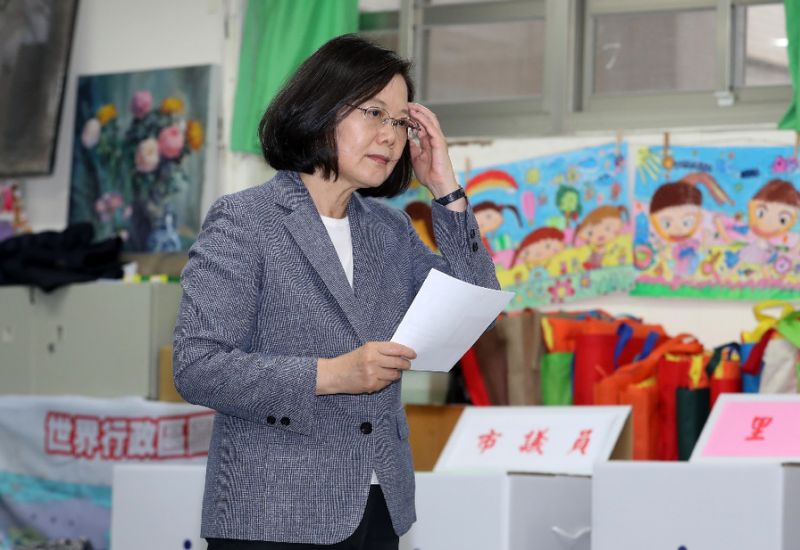
The Beijing-friendly main opposition Kuomintang (KMT) made gains in the face of China's increasing pressure on the island.
Taiwan is still awaiting the result of a closely watched referendum on gay marriage, with activists fearing a win for conservative "pro-family" campaigners would turn back the clock on the island's reputation as a trailblazer for marriage equality.
Tsai and her Democratic Progressive Party (DPP) have faced a mounting backlash over domestic reforms including pension cuts, as well as concerns about deteriorating ties with China, which still sees self-ruling Taiwan as part of its territory to be reunified.
Tsai told reporters that she would take "complete responsibility" for the defeat as chair of the party.
"I resign as DPP chairperson. Our efforts weren't enough and we let down all our supporters who fought with us. I want to express our most sincere apologies."
Taiwan votes in test for pro-independence ruling party as China watches
The KMT, which oversaw an unprecedented thaw with Beijing before Tsai took office in 2016, declared victory in 15 of 22 city and county seats, up from just six going into the election.
The DPP, which went into the election with 13 seats, declared victory in only six and lost its traditional stronghold in Kaohsiung city for the first time in 20 years.
The Taipei mayoral seat is still to be announced.
Beijing has intensified pressure on Taiwan under Tsai, upping military drills, poaching diplomatic allies and successfully convincing international businesses to list Taiwan as part of China on their websites.
The DPP is traditionally pro-independence and Tsai has refused to acknowledge Beijing's stance that Taiwan is part of "one China", unlike her KMT predecessor Ma Ying-jeou.
Ahead of the vote, Tsai and DPP officials repeatedly said they believed China has meddled in the lead-up to the elections through a "fake news" campaign, which Beijing has denied.
The KMT -- which lost the leadership and its majority in parliament two years ago as the public feared it had moved too close to Beijing — framed the election as a vote of no confidence in Tsai, with promises to boost the economy and promote peaceful relations with China.
Votes in 10 referendums which were also on the ballot paper were still being counted late Saturday and include pro- and anti-gay marriage proposals.
A landmark court decision legalising gay marriage is still to be implemented and LGBT groups are concerned a referendum win for conservative campaigners could limit their newly won rights.
"Pro-family" groups have put forward a referendum calling for marriage to be legally defined as between a man and a woman and for same-sex unions to be governed by a separate law.
Thousands rally in Taiwan, call for referendum on independence from China
College student Kwan Chin-shun, 18, voting in Taipei, said she supported equal marriage rights.
"There's nothing wrong with loving someone of the same sex," she told AFP.
Others said they sided with "pro-family" groups.
"The purpose of getting married is to have children and Taiwan's birthrate is already one of the world's lowest. Gay people can have relationships like heterosexual couples, but they don't have to get married," said a female voter who gave her name as Bai.
The complex ballots also included a referendum on a bid to change the name under which Taiwan competes at international sports events that has already angered China.
The referendums come as an extra headache for Tsai and the DPP.
Tsai had framed the local elections as a way to "tell the world" that Taiwan would not bow to Beijing.
Social media posts said to be "fake news" have included photos of discarded bananas and pineapples which were framed as proof the government did not care about farmers, as well as posts which suggested Taiwan had failed to get its citizens out of Japan after a typhoon—a senior Taiwan official in Osaka committed suicide after the reports.
Taiwan's Investigation Bureau also said it is probing Chinese influence on the elections through campaign funding of candidates.









1732105641-0/BeFunky-collage-(78)1732105641-0-270x192.webp)







COMMENTS
Comments are moderated and generally will be posted if they are on-topic and not abusive.
For more information, please see our Comments FAQ